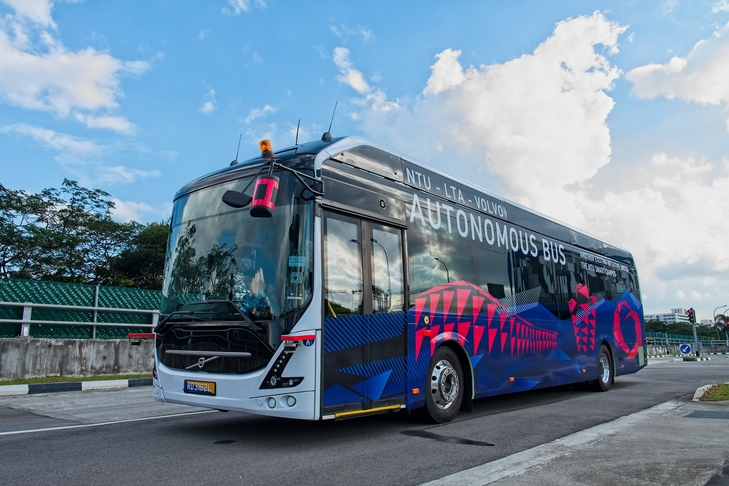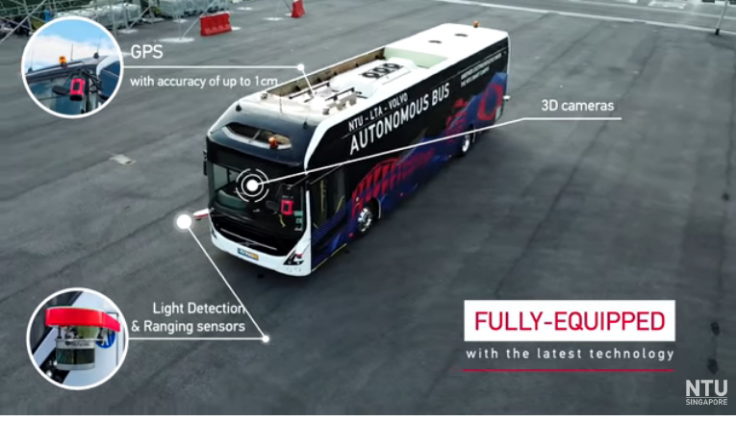
Singapore's Nanyang Technological University (NTU) rolled out its first electric driverless bus in collaboration with auto major Volvo on Tuesday that will go on trial run on its sprawling campus before hitting the main roads.
Singapore has been in the forefromt for self-driving automobile technology and the world's first driverless taxis were put on a limited public trial way back in 2016. The driverless Volvo buses will be test-run for improvements to be incorporated in final bus model that would be tested on public roads, said Volvo and NTU in a statement.
The project was undertaken in October 2016 by NTU and Volvo under the university's partnership with the Land Transport Authority (LTA) to develop these buses for transportation on fixed routes with scheduled services. The prototype unveiled today is a single-deck Volvo Electric bus measuring 12 metres long to accommodate 36 passengers.

In addition, the Volvo 7900 Electric bus is equipped with several safety sensors and navigation controls managed by a comprehensive artificial intelligence (AI) system. It provides maximum safety and reliability, and the AI system is protected with cybersecurity measures to prevent unwanted cyber intrusions.
The Volvo bus unveiled today is the first of two that has undergone rigorous testing at the Centre of Excellence for Testing and Research of Autonomous vehicles at NTU (CETRAN). After successful test within the university campus, the bus route will be extended beyond NTU campus, said the unviersity.
The seating capacity in the electric bus is 36 seats and provides a quiet operation with zero emissions. Moreover, it requires 80 per cent less energy than a bus that runs on diesel, he noted. Volvo has chosen NTU Singapore as its global partner for the project.

The NTU and Volvo joint partnership is part of NTU's living lab platform that assesses technology maturity and road-worthiness, including the certification of technologies for deployment on public roads.
The bus will undergo rigorous tests at CETRAN jointly set up by NTU, LTA and JTC, which is dedicated to develop and test autonomous vehicles for Singapore's urban road condition, such as traffic signals, multiple bus stops and pedestrian crossings, and tropical conditions such as driving through heavy rain and partially flooded roads. See the video:
Operated by NTU scientists, CETRAN is located on the NTU Smart Campus in the Jurong Innovation District. Its multiple sensors include light detection and ranging sensors (LIDARS), stereo-vision cameras that capture images in 3D, and an advanced global navigation satellite system that uses real-time kinematics. Similar to any global positioning system (GPS), it also uses multiple data sources to give the exact location accuracy of up to one centimetre, said the university.
The system is also hooked up to an "inertial management unit" that acts like a two-in-one gyroscope and accelerometer, measuring the lateral and angular rate of the bus, to improve its navigation over uneven terrain and around sharp bends, ensuring a smoother ride.
These sensors and GPS platforms, to be managed by a comprehensive AI system developed by NTU researchers, enables it to navigate autonomously through dense traffic and tropical weather conditions. In addition, the AI system is protected with cybersecurity and firewall measures to prevent unwanted intrusions for maximum safety and reliability, said the research team.

Stake holders such as Singapore's public transport operator SMRT will play a key role in determining the roadworthiness of autonomous vehicles on public roads. When the second bus is rolled out, it will undergo tests at a bus depot managed by SMRT with a real-world environment to assess the vehicle's ability to autonomously navigate into vehicle washing bays and park safely at charging areas.
ABB, a pioneer in fast-charging infrastructure for electric vehicles, is also collaborating with NTU to develop a smart fast-charging solution. Based on the OppCharge concept, ABB's HVC 300P fast charge system is being tested for autonomous charging in bus depots as well as in running traffic.
Offering a charge power of 300kW via a pantograph mounted on the infrastructure, the fast chargers will recharge a battery in just three to six minutes. This will enable charging during the layover times at the end of the bus route, without impacting normal operations.








